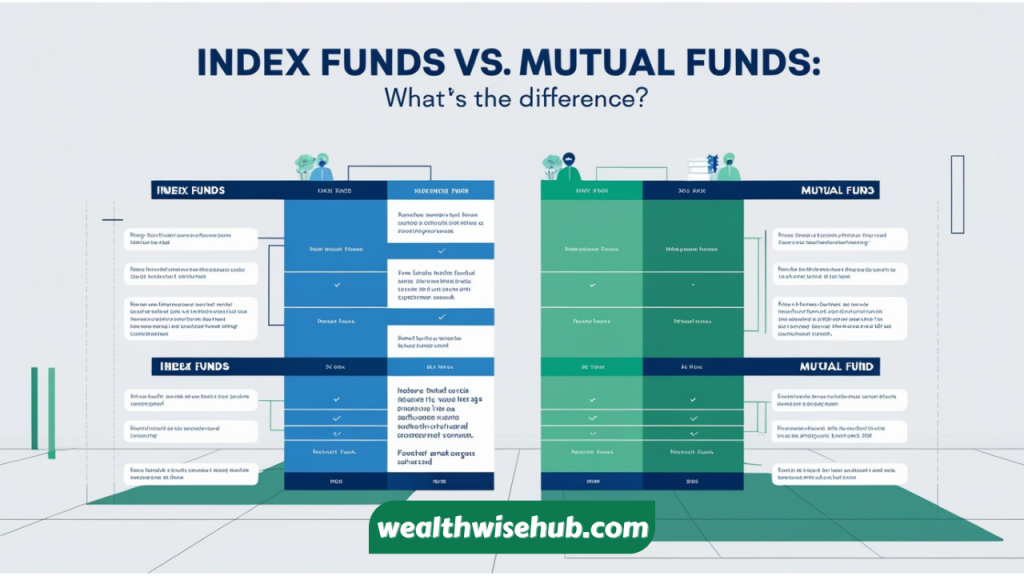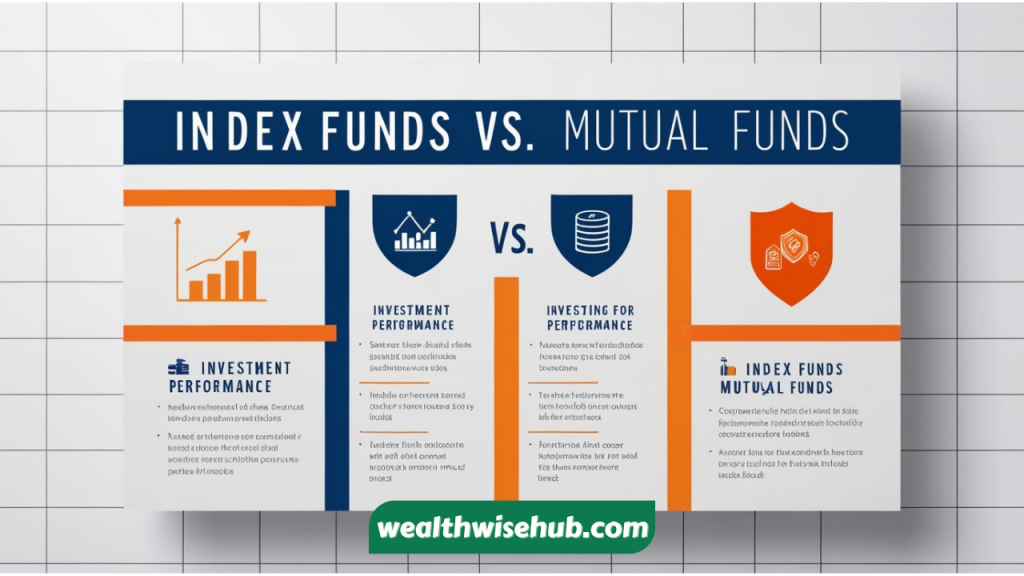
Discover the key differences between index funds and mutual funds, their benefits, risks, and which may be the right choice for your investment strategy.
Are you looking to grow your wealth but unsure whether to invest in index funds or mutual funds? Understanding the differences between these popular investment vehicles can be the key to making a smart financial decision. Each option has its advantages, risks, and unique strategies tailored to different financial goals.
In this guide, we’ll break down the pros and cons of index funds and mutual funds, explore their fees, risk levels, and returns, and help you determine which one may be the best fit for your investment portfolio. Get ready to make an informed choice that aligns with your financial goals!
Index Funds vs. Mutual Funds: An Overview
What Are Index Funds?
Index funds are a type of investment fund designed to mirror the performance of a specific market index, such as the S&P 500. Managed passively, index funds aim to track the overall market performance rather than outperform it. This approach can make index funds an ideal option for investors looking for low-cost, steady growth over time.
Advantages of Index Funds
- Lower Fees: Since index funds are passively managed, they tend to have lower expense ratios.
- Diversification: By investing in an index fund, you gain exposure to a wide range of companies within a particular index.
- Consistency in Returns: Index funds historically offer reliable, steady returns by mirroring market performance.
Disadvantages of Index Funds
- Limited Growth Potential: Index funds aim to match the market, not outperform it, which may limit growth in a strong economy.
- Market Dependency: Returns can be highly dependent on the market’s overall performance, meaning potential losses during market downturns.
What Are Mutual Funds?
Mutual funds, on the other hand, are actively managed by professional portfolio managers who aim to beat the market by carefully selecting stocks, bonds, or other assets. Unlike index funds, which track an index, mutual funds rely on the expertise of managers to potentially deliver better returns, albeit often at higher costs.
Advantages of Mutual Funds
- Potential for Higher Returns: With skilled fund managers, mutual funds have the potential to outperform the market.
- Diverse Investment Strategies: Mutual funds offer a variety of approaches, such as growth, income, and balanced funds, allowing for more tailored options.
- Professional Management: Fund managers provide active oversight, continuously adjusting the fund’s composition to respond to market conditions.
Disadvantages of Mutual Funds
- Higher Fees: Management fees and other expenses can be significantly higher than index funds.
- Risk of Underperformance: Actively managed funds don’t always beat the market and can sometimes underperform.
- Tax Implications: Frequent trading within mutual funds can lead to taxable events, which may increase your tax burden.

Key Differences Between Index Funds and Mutual Funds
1. Management Style
- Index Funds: Passive, designed to replicate a market index.
- Mutual Funds: Actively managed to outperform the market.
2. Cost and Fees
- Index Funds: Generally have lower expense ratios, making them cost-effective for long-term investors.
- Mutual Funds: Higher fees due to active management and frequent trading.
3. Performance and Risk
- Index Funds: More consistent returns that match the market but less chance for substantial gains.
- Mutual Funds: Higher potential for gains but also increased risk, as returns depend on the manager’s skill.
4. Tax Efficiency
- Index Funds: More tax-efficient due to less trading.
- Mutual Funds: Can generate more capital gains, impacting tax obligations.
Which Investment Is Right for You?
Who Should Consider Index Funds?
Index funds are ideal for long-term investors looking for low-cost, low-maintenance options. If you prefer steady returns and are content with matching market performance, index funds might be the best choice. Additionally, index funds are well-suited for investors focused on tax efficiency and lower expenses.
Who Should Consider Mutual Funds?
Mutual funds may be the better option if you’re seeking higher potential returns and don’t mind paying for active management. Investors who want more tailored investment strategies and are willing to accept higher fees for professional management may benefit from mutual funds. However, it’s important to have a higher risk tolerance and a long-term investment horizon.

How to Decide on the Right Fund for You
Assess Your Financial Goals
Consider your long-term financial goals and the level of growth you expect. Index funds work well for wealth preservation, while mutual funds might be better suited for wealth growth.
Analyze Your Risk Tolerance
If you’re comfortable with potential losses for the chance of high returns, a mutual fund might align with your goals. If you prefer stability, index funds are more suitable.
Consider Fees and Expenses
Investors focused on minimizing costs often lean toward index funds. However, if you’re willing to pay for active management, the benefits of mutual funds could outweigh the fees.
Conclusion:
Choosing between index funds and mutual funds comes down to your financial objectives, risk tolerance, and cost preference. Index funds offer low-cost, steady growth by tracking the market, while mutual funds provide the potential for higher returns at the cost of higher fees and increased risk. Both investment types have their advantages, and understanding your personal goals is essential for making the best choice.
Deciding between index funds and mutual funds may seem challenging, but with the right insights, you can make a choice that aligns with your goals. Each has unique benefits, so the best option depends on your financial strategy. Share your thoughts below—are you leaning toward index funds for stability or mutual funds for potential gains? We’d love to hear about your investment journey!
FAQs:
1: What is the main difference between index funds and mutual funds?
Index funds are passively managed and track a market index, while mutual funds are actively managed by professionals aiming to outperform the market.
2: Which is better for long-term investing, index funds or mutual funds?
Index funds are often better for long-term investing due to their lower fees and consistent performance, but mutual funds can be beneficial if actively managed funds outperform their benchmarks.
3: Are index funds cheaper than mutual funds?
Yes, index funds typically have lower expense ratios because they don’t require active management, making them more cost-effective over time.
4: Can I invest in both index funds and mutual funds?
Absolutely. Many investors use a mix of index funds for cost efficiency and mutual funds for potentially higher returns, depending on their financial goals and risk tolerance.
5: How do I decide which is right for me?
Consider your investment goals, risk tolerance, and the fees associated with each option. If you prefer low-cost, passive investing, index funds may suit you better. If you’re comfortable with higher fees for potential outperformance, mutual funds might be worth exploring.
Recommended Reading:
📖 The Little Book of Common Sense Investing by John C. Bogle
A must-read for understanding the value of index funds and why low-cost, passive investing often outperforms active strategies.
📖 Common Stocks and Uncommon Profits by Philip A. Fisher
While focused on stock investing, this book provides insights into evaluating funds and investment options, helping readers make informed decisions.
📖 Bogle on Mutual Funds: New Perspectives for the Intelligent Investor by John C. Bogle
A comprehensive guide to mutual funds, offering advice on evaluating funds and understanding their role in a diversified portfolio.
Get Financial Advice Daily
Start earning online with this beginner-friendly system! No prior experience needed—see how it works: Discover more